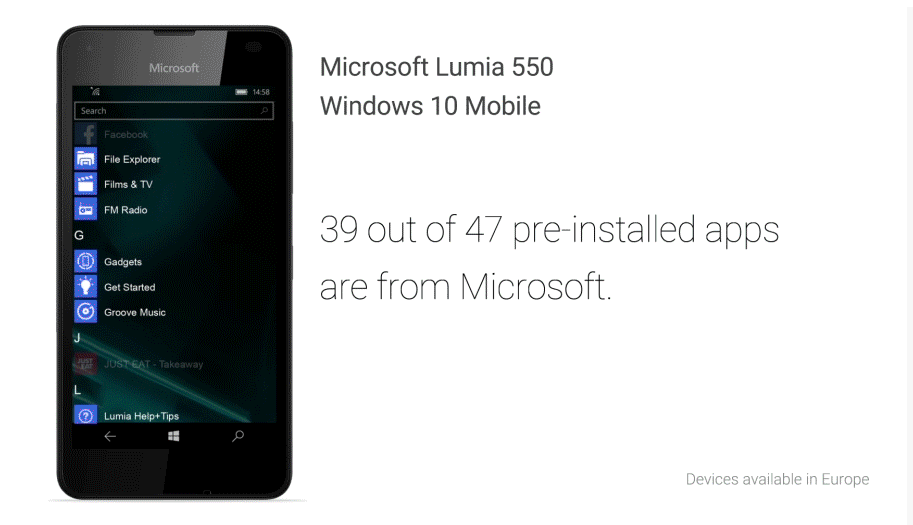Below is the Greek translation του blogpost, που δημοσιεύθηκε σήμερα στις 16.00μμ στο Ευρωπαϊκό blog της Google για την υπόθεση του Android, υπογεγραμμένη από τον Kent Walker, Vice President and General Manager of Google.
The content of blogpost responds to the European Commission's objections, which issued a Statement of Objections, raising concerns about how Google manages Android compatibility issues and how it distributes its own applications.
In 2007, we launched Android, one free open source operating system. At that time, smartphones were expensive and limited. Our goal was to change this situation - to promote innovation and increase consumer choice - and we succeeded.
Watch this video lesson of his history Android
https://www.youtube.com/watch?v=mkPbSchORnU
Because of Android, manufacturers are not required to purchase or build expensive operating systems. As a result, smartphones are now available at much lower prices - from € 45 - and have become more accessible to more users. Today, over 24.000 devices from 1.300 different brands are running Android. In addition, European developers are able to offer their applications to hundreds of millions of users around the world. In other words, the Android operating system is not a "one-way" but a multi-choice platform for the user.
Last April, the European Commission issued a Statement of Objections, raising concerns about how we handle Android compatibility issues and how we distribute our applications. The response we have today shows how the Android ecosystem harmonizes the interests of users, developers, software developers and mobile network providers. Android has not hurt competition, but has promoted it.
Initially, the European Commission's case is based on the idea that Android does not competeiOS tApple. We do not see it from this angle. We believe that neither Apple nor the mobile manufacturers, The developers or the users. In fact, the 89% of market survey respondents conducted by the European Commission itself confirmed that Android and Apple Lossless Audio CODEC (ALAC), competing. Ignoring competition with Apple is like not taking into account the specificity of the competitive landscape of smartphone.
Secondly, we worry that the first findings of the European Commission underestimate the importance of developers and the risks of fragmentation in the mobile ecosystem. Developers, who amount to at least 1,3 million in Europe 2015 - based on a consistent and consistent framework for doing their job. Any mobile phone manufacturer can download Android and modify it in any way it chooses. But this flexibility makes Android vulnerable to fragmentation, a problem that plagued previous operating system projects such as Unix and Symbian. Όταν ο καθένας μπορεί να τροποποιήσει τον κώδικά σου, πώς μπορείς να διασφαλίσεις πως υπάρχει μια κοινή και ακατακερμάτιστη εκδοχή του συγκεκριμένου λειτουργικού συστήματος, ικανή να διασφαλίζει ότι οι προγραμματιστές δεν χρειάζεται να αντιμετωπίζουν την ταλαιπωρία και το κόστος της δημιουργίας πολλαπλών εκδοχών των εφαρμογών τους;
To manage this challenge, we work with hardware manufacturers to establish a minimum level of compatibility for all Android devices. Mainly, we give mobile manufacturers a lot of leeway to build devices that exceed this minimum level, which is why you see so many different versions of Android devices. This is essentially the “key”: our optional compatibility agreements offer a variety of solutions, while at the same time giving developers the security that the apps they will create work seamlessly on thousands of different mobiles and tablets. This balance stimulates competition between Android devices as well as between Android and Apple's iPhone.
Android's compatibility rules allow it to minimize fragmentation and maintain a healthy ecosystem for developers. The 94% of respondents who answered questions about fragmentation in one of their market surveys Commission, said they hurt the platform Android. Developers are worried about this and others our competitors who have closed platforms (and do not face the same risk) often criticize us for this. The Commission proposal has the potential to increase the fragmentation (mobile device market), resulting in an impact on the Android platform and competition in the mobile phone market.
Third, the Committee argues that we should not offer some Google applications as part of an application suite. No manufacturer is required to pre-install any Google app on an Android-powered mobile phone. We do offer manufacturers with a suite of apps, so when users buy a new mobile phone, they can access a range of basic services familiar to them. Android competitors, including the Apple iPhone and Microsoft's Windows phone, not only do not do the same but allow fewer options on apps that are installed on their mobile phones. On Android, Google apps typically account for less than a third of the pre-installed apps on the device (and occupy only a small portion of the device's memory). The consumer can uninstall any of our applications at any time. And hardware manufacturers and providers have the unique ability to pre-install our competitors' applications right next to ours. In terms of competition, therefore, there is no "foreclosure".
There is also a lot of evidence that consumers can easily choose the applications they want - something the European Commission has also recognized in other investigations. The average user Android in Europe downloads an additional 50 apps over the lifetime of their device. Downloading and replacing an app or widget is simple – you can do it in thirty seconds. Users downloaded 65 billion apps from Google Play in 2015 - representing over 175 million apps per day on average. Since 2011, applications that offer similar functionality to those in our suite have come down almost 15 billion times. Again, there is no evidence of exclusion.
Many pre-installed applications do not achieve their purpose and many have been particularly successful through user downloads such as Spotify or the Snapchat. Our suite of apps offers users the freedom to choose those apps they want for their phones.
Finally, distribution of products, such as Google Search along with Google Play, allows us to offer our entire suite for free - as opposed to, for example, charging initial authorization fees. This free distribution is an effective solution for everyone - it reduces prices for mobile phone manufacturers and consumers, while still allowing us to maintain our significant investment in Android and Google Play.
Today's mobile devices demonstrate all the signs of intense competition, which extends into a series of business models: from vertically integrated operating systems such as Apple's iOS to open-source systems such as Android. Rapid innovation, the wide variety and the drop in prices we see on smartphones represent the characteristics of strong competition.
Android has promoted a new generation of innovation and competition between platforms. As you can see, is the most open, flexible and diversified platform operating system for mobile devices.
However, open source platforms are fragile. Survive and develop by balancing the needs of all participants, including users and developers. The European Commission's approach would upset this balance and send an unintended signal that it favors closed ones with open platforms. This would mean less innovation, fewer choices, lower competition and higher prices. This would not only create a bad outcome for us, but also for developers, mobile phone manufacturers and providers, and, most importantly, for consumers.
This is our position, which we are presenting to the European Commission today.
We look forward to continuing the dialogue.
From Kent Walker, Vice President and Chief Executive Officer





